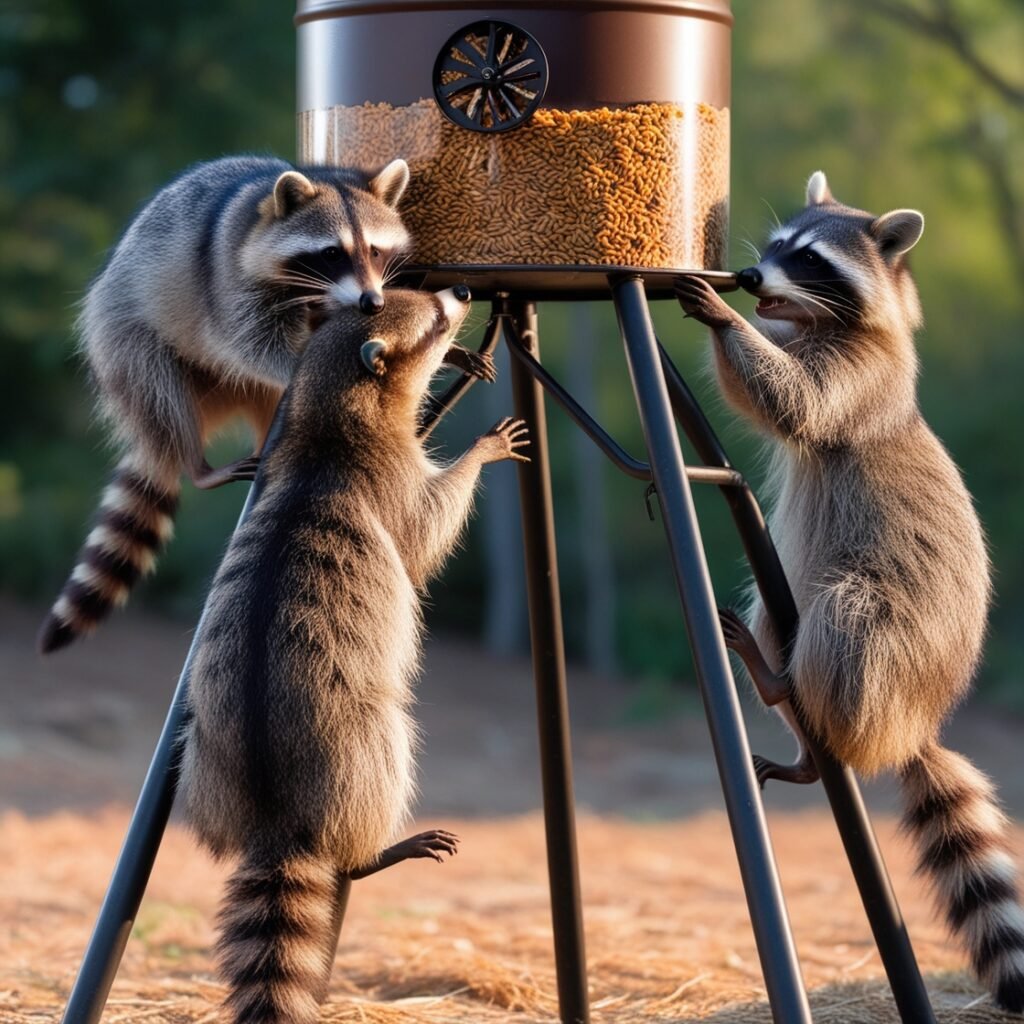It may appear cute, but raccoons will give you a headache when trying to keep the deer feeder safe from them. These deceptively smart and highly persistent animals have a well-deserved reputation for defeating common deterrents and wreaking havoc on feeders and surrounding foliage.
Understanding the Raccoon Challenge

Raccoons have a surprising intelligence and dexterous little paws that will make short work of your best efforts to protect your deer feeders. Here are some common pitfalls in outsmarting raccoons:
- Determination: This is what makes them so difficult to deal with; raccoons are persistent and will find their way over, under, around, or through anything that is in their way or completely ignore anything that tries to keep them out.
- Nature of despicable: This vicious breed does not limit themselves to only the feed; they ruin plants and agitate the feeder arrangement too.
- Selective Deterrence: we want to detour raccoons but we do not want to detour deer.
Proven Strategies to Keep Raccoons Away From The Deer Feeder
Motion-Activated Sprinklers
Case Study: The Illinois Wildlife Conservation Office employed the use of motion-activated sprinklers to target raccoons active at night, conditioning them to avoid the area.
How It Works: Program sprinklers to go off during the nocturnal peak hours for raccoons. Set it up to obstruct the most likely routes racoons take when going for your feeder.
Benefits: It works effectively without disturbing deer, who typically are active during the early morning or evening, and is humane and non-lethal.
Durable, Locking Feeders
How it Works: The best feeders come with a durable lock and are even raccoon-resistant to ensure that only deer (and not a smart paw) can get to the food inside.
Benefits: Deer have free access to undisturbed forage, but raccoons face frustration. Also, it helps to lessen any raccoon vandalism.
PVC Pipe Baffles
Case Study: In Florida, a forest management team affixed wide-diameter PVC pipe baffled to feeder poles to prevent raccoons from climbing onto the poles to access feeders.
PVC Tube Feeder Installation: Attach large PVC pipes to poles supporting the feeder. The smooth and wide surface is hard for raccoons to clutch and ascend.
Benefits: This one is easy, cheap and does not prevent deer access, so it is a deterrent in-soil.
Additional Tips for Raccoon-Free Feeding
Secure Extra Feed: Place any additional feed in a secured location away from the feeder area to reduce attracting the raccoons.
Routine Inspections: Inspect feeders for signs of wear and tear and repair as necessary to prevent raccoon access.
Natural Repellents: Put some hot pepper flakes in the feed to keep the coons away but this might also keep the deer away, so use in moderation
Did You Know?
Raccoons are one of the smartest animals that can remember solutions to types of problems they encounter for at least three years! They have great skill in getting through obstacles (not just luck) and it what made these methods work for them because they know how smart they are.
Best Place for your Feeder
Here are some tips:
Use Natural Cover: Put the feeder as close to natural cover, such as bushes, trees or cover that the deer is likely to feel comfortable getting to, as possible.
Perfect Height: The feeder should ideally be placed about 3-4 feet off the ground. High enough for the deer to get to, but not so low that smaller creatures do.
FAQ: Raccoons Deterrence and Deer Feeder Maintenance
Q: Why Do Raccoons Keep Coming To My Deer Feeder?
A: Raccoons are drawn to places where food is easy and abundant, such as deer feeders. They are very adaptable and can come back again if food is easily accessible.
Q: Do PVC baffles really work to stop raccoons?
A: Yes, PVC baffles work because raccoons cannot climb up broad, smooth surfaces. This cheap option is commonly used for bird and deer feeders.
Q: Are there any natural repellents for raccoons that don’t affect deer?
A: Raccoons are deterred by natural repellents such as hot pepper flakes, but you can also irritate deer with those blends. Other hunters have had success with scents that raccoons hate when they are placed around the feeder instead of inside the feed, like vinegar or garlic.
Q: Do motion-activated deterrents repel deer?
A: Install motion-activated sprinklers or lights, which could startle deer if they go off during the day. Only switch on at night so deer are content, and raccoons go elsewhere.
Conclusion
If raccoons are ruining your deer feeder, these are tactics that will help you prevent that from happening anymore. Motion-activated sprinklers, locking feeders and PVC pipe baffles will fend off raccoons while continuing to lure the deer. Seek help from wildlife management professionals. A good deer feeding area will strike a balance between deterrence and attraction. Happy feeding!
